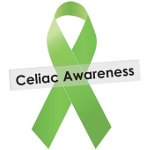International Celiac Disease Awareness Day Date in the current year: May 16, 2026
 International Celiac Disease Awareness Day, also spelled as International Coeliac Disease Awareness Day, is observed annually on May 16. It was established in 2013 to raise awareness of an autoimmune disorder that causes patients to develop an intolerance to gluten.
International Celiac Disease Awareness Day, also spelled as International Coeliac Disease Awareness Day, is observed annually on May 16. It was established in 2013 to raise awareness of an autoimmune disorder that causes patients to develop an intolerance to gluten.Gluten is an umbrella term for a group of proteins found naturally in all varieties of wheat, barley, rye and some oats. It is found in a wide range of products made from these grains, including bread and pastries (it is gluten that gives the dough its elasticity and ability to rise), beer, soy sauce, some meat substitutes such as seitan, and even products such as ketchup and ice cream, where it is used as a stabilizer.
In some people, gluten can cause adverse reactions that can be autoimmune (celiac disease, gluten ataxia, dermatitis herpetiformis), allergic (wheat allergy), and non-autoimmune, non-allergic (gluten sensitivity). Celiac disease is the most common gluten-related disorder, affecting 1-2% of the general population.
Celiac disease is an autoimmune disorder in which the body produces antibodies in response to gluten that cause inflammation in the small intestine. It is more common in people who have a genetic predisposition, but not all those genetically predisposed will develop celiac disease. There is a theory that the disease may be triggered by factors such as infection, surgery, pregnancy, emotional stress, etc.
People with celiac disease develop gastrointestinal symptoms such as diarrhea, bloating, abdominal pain, and loss of appetite after ingesting gluten. Inflammation in the small intestine can cause atrophy of the villi (small projections that line the inner wall of the small intestine and enhance nutrient absorption), resulting in malabsorption of nutrients. Malabsorption-related complications of celiac disease include weight loss in adults or failure to thrive in children, fatigue, anemia, osteopenia (low bone density) or osteoporosis, and various vitamin/mineral deficiencies.
There is no cure for celiac disease. The only effective treatment is lifelong adherence to a gluten-free diet to prevent symptoms and complications. If left untreated, celiac disease can lead to intestinal cancer. A gluten-free diet strictly excludes gluten-containing grains and any foods that may contain them. Because many processed foods contain gluten as an additive, people with celiac disease should read labels carefully and choose products that are clearly labeled as gluten-free. It is also important to avoid cross-contamination.
International Celiac Disease Awareness Day events are organized by national celiac disease associations around the world, as well as international organizations such as the Association of European Celiac Societies (AOECS), healthcare facilities and other stakeholders. Their main goal is to raise awareness of celiac disease and other gluten-related issues among the general public, combat misinformation and misconceptions about celiac disease, and share valuable information and resources with people affected by the disease.
- Category
- International Observances
- Tags
- International Celiac Disease Awareness Day, international observances, celiac disease, awareness days, gluten-related disorders